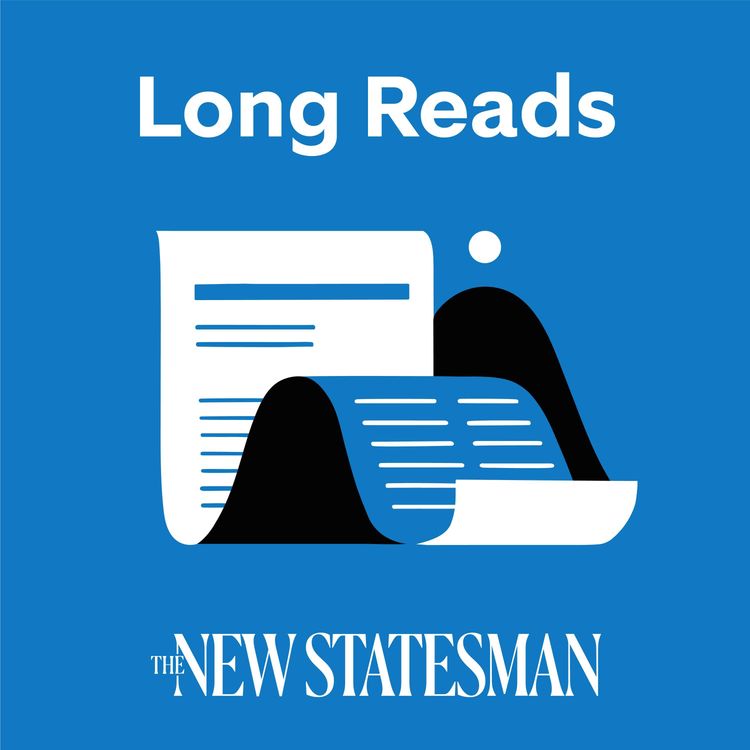Share

Audio Long Reads, from the New Statesman
The prime minister and the AI that solved the climate crisis
After the extreme heat of summer 2024, which saw children stretchered out of their exams, Britain’s prime minister calls a press conference in Westminster Hall. He has one eye on life after office (skiing in Aspen, a big gig in Silicon Valley), but before he leaves, he wants to unveil something truly ground-breaking: a large language model that has been trained by the best minds to solve the climate crisis.
In this satirical work of speculative fiction, the New Statesman’s business editor Will Dunn explores the government’s love affair with Big Tech, fast-forwarding to the dying days of a Conservative government. Climate protestors have been cleared from the roads - but the tarmac is melting and people want answers. Could an advanced AI called Tom provide the prime minister’s moonshot moment?
Written and read by Will Dunn. You can read the text version at newstatesman.com
If you enjoyed this episode, you might also enjoy Edward Docx reading Boris Johnson: the death of a clown.
Download the New Statesman app:
iOS: https://apps.apple.com/gb/app/new-statesman-magazine/id610498525
Android: https://play.google.com/store/apps/details?id=com.progressivemediagroup.newstatesman&hl=en_GB&gl=US
Subscribe to the New Statesman from £1 per week:
https://newstatesman.com/podcastoffer
Sign up to our weekly Saturday Read email
More episodes
View all episodes

The UK’s leading romance fraud specialist
46:13|How did one detective take on an international network of romance fraudsters? This episode was written Stuart McGurk and read by Will Dunn. The commissioning editor was Melissa Denes.
The great private school con
29:19|They no longer have a stranglehold on Oxbridge and would lose tax breaks under Labour. So what is elite education really selling?At the Labour Party conference in Liverpool in October, the Independent Schools Council hosted a forlorn drinks reception: not one of the more than 40 MPs showed up. ‘We are not the enemy,’ one private school headmaster complained to a sympathetic Daily Mail. But if Labour does win the next general election, it has committed to removing tax breaks on business rates and 20% VAT on private school fees – raising £1.6bn to be invested in state schools. On top of this, Starmer’s cabinet (as it stands) would be the most state-educated in history – with only 13% having attended private school (against Rishi Sunak’s 63%). Can elite education survive – and cling on to its charitable status?In this week’s audio long read – the last in this series – the New Statesman’s features editor Melissa Denes attends three school open days to understand how these winds of change might affect them. She also follows the money, calculating that – allowing for tax breaks - the average taxpayer subsidises an Eton schoolboy at a far higher rate than a state school one. As the gaps in spending between the two sectors grow, and society strives to become more fair, will an expensive education evolve into a luxury service rather than a charitable concern?Written and read by Melissa Denes.This article originally appeared in the 10-16 November edition of the New Statesman; you can read the text version here.If you enjoyed listening to this article, you might also enjoy The decline of the British university by Adrian Pabst.
How Rishi Sunak became the first Silicon Valley prime minister
22:27|On 2 November 2023, Rishi Sunak closed his global AI Safety Summit at Bletchley Park by interviewing the richest man on Earth, Elon Musk. The mood was deferential (the PM towards the tech billionaire). Was Sunak eyeing up a post-politics job in San Francisco, some wondered, or calculating that Musk’s Twitter might be an effective campaigning tool come 2024? In this week’s audio long read, the New Statesman contributing writer Quinn Slobodian examines the origins of Sunak’s “fanboy-ish enthusiasm” for the billionaire tech disruptors. These lie in the publication of a 1997 business book, he writes: The Sovereign Individual: How to Survive and Thrive During the Collapse of the Welfare State, by the American venture capitalist James Dale Davidson and William Rees-Mogg, father of Jacob. The book has become cult reading among tech leaders, and influential on the alt-right: its world view of a libertarian internet and the rise of economic freeports and tax havens chimed with a wealthy elite who saw a chance to get much, much richer. In Sunak, Slobodian argues, we see the arrival of the sovereign individual in Downing Street: “a ‘two-fer’, as they say in America: both its first Silicon Valley prime minister and its first hedge fund prime minister”. Written by Quinn Slobodian and read by Will Lloyd. This article originally appeared in the 2 November 2022 issue of the New Statesman; you can read the text version here. If you enjoyed this episode, you might also enjoy Sam Bankman-Fried and the effective altruism delusion by Sophie McBain.
Israel, Hamas and the unravelling of the West
16:11|What might be the long term impact of the Israel-Hamas war on global alliances? In this week’s audio long read, the New Statesman’s contributing writer John Gray reflects on three weeks of bloodshed, beginning with the massacres of 7 October, and their wider consequences. An escalating conflict will empower Iran and Russia, he writes, as well as strengthen swing states such as Saudi Arabia and Qatar. The United States might abandon Ukraine, or dilute its commitment to defending Taiwan from China. And with a presidential election on the horizon, does the White House have the stamina for a protracted foreign war? Already support for both Israel and Palestine has become sorely contested across the West, as Keir Starmer faces pressure from Muslim (and non-Muslim) MPs in the UK, while Emmanuel Macron has banned pro-Palestinian protest. Egypt and Lebanon have said they will not accept Palestinian refugees. For Gray, the events of 7 October mark the point at which the post-Cold War order finally fractured. “We have entered a world of imperial rivalries like that before 1914, which ended in Europe’s suicide in the trenches,” he writes. If America rose to become the global superpower after the second world war, that influence is now coming to an end.Written by John Gray and read by Melissa Denes.This article originally appeared in the 27 October-2 November edition of the New Statesman; you can read the text version here. If you enjoyed this episode, you might also enjoy listening to The Dawn of the Saudi Century, by Quinn Slobodian.
Has your AI therapist got your back?
21:53|In May this year, an American woman sought the help of a chatbot on an eating disorders website. The bot, named Tessa and running on an evolving, generative AI, advised her to start counting calories. Perhaps she should get some calipers, it suggested, to measure her body fat. When it emerged that Tessa had given similarly dangerous advice to others, the bot was taken down. As countries around the world face a mental health crisis, exacerbated by the pandemic and a lack of human therapists, a new tech goldrush has begun. Can the latest self-help chatbots help meet a desperate need, delivering “microtherapy” sessions on demand? Do they have a place in disaster zones - or do people in crisis deserve human attention and support? In this week’s audio long read, freelance reporter and author of Sex Robots and Vegan Meat Jenny Kleeman talks to the people behind the latest incarnations of AI therapy in the UK and the US, as well as the technology’s critics. Written by Jenny Kleeman and read by Zoe Grunewald. This article originally appeared in the 13-19 October edition of the New Statesman. You can read the text version here. If you enjoyed this episode, you might also enjoy The psychiatrists who don’t believe in mental illness by Sophie McBain
How Britain became a dangerous place to have a baby
23:54|What are the roots of today’s maternity crisis? Recent research by the Care Quality Commission has found a “concerning decline” in England, with over half of maternity wards rated substandard. Donna Ockenden’s review of Shrewsbury and Telford maternity trust found that, between 2001 and 2019, 201 babies and nine mothers had died avoidable deaths. In this week’s audio long read, the editor of the New Statesman’s Spotlight magazine Alona Ferber traces the origins of this decline – from the advent of woman-centred care in the 1980s to today’s more frayed and divided landscape. Are austerity and political indifference the key factors, and does an ideological split over ‘natural’ and ‘medical’ birth play a part? “Thirty years ago,” Ferber writes, “when power moved from the institution to the individual, that shift was radical, progressive and revolutionary. It was about women’s rights and politics, as much as it was about health. But today the system is so stretched that the nexus of power is nowhere. It is not with clinical staff, nor with families. Instead, we muddle through.” Drawing on interviews with practitioners and her own birth experiences, she pieces together the elements of an ongoing crisis. Written and read by Alona Ferber. This article was originally published on 30 September 2023 and you can read the text version here. If you enjoyed this episode, you might also like Sophie McBain on The ADHD decade: what’s behind the boom in adult diagnoses
A year inside GB News: "We’re going to disrupt"
47:35|For today’s Audio Long Read we’re bringing you one from our archives, which is suddenly extremely prescient. This week GB News is in the spotlight once again, this time for broadcasting misogynist comments made by Laurence Fox about a female journalist, Ava Evans. The channel has suspended Fox, along with host Dan Wootton, and has apologised for broadcasting the comments. But this is the latest in a long line of incidents in which GB News has pushed the boundaries of what is acceptable in broadcast journalism. In 2022 we published Stuart McGurk’s investigation into the origins of the right-wing news channel, speaking to insiders working in the founding team including senior journalists, editorial and production staff, and the chief executive himself. Stuart’s article, which is both alarming and hilarious, sheds light on the tumultuous origins of GB News and provides context for its current battle to be taken seriously.This article was originally published online on the New Statesman in April 2022; you can read the text version here. If you enjoyed listening to this episode, you might also like Cancel culture comes to GB News, by Clive Martin.
The philosopher and the crypto king: Sam Bankman-Fried and the effective altruism delusion
36:12|At the time of writing, the crypto billionaire Sam Bankman-Fried is due to stand trial on 3 October 2023. He stands accused of fraud and money-laundering on an epic scale through his currency exchange FTX. Did he gamble with other people’s money in a bid to do the maximum good? In this week’s long read, the New Statesman’s associate editor Sophie McBain examines the relationship between Bankman-Fried and the Oxford-based effective altruism (EA) movement. The billionaire was a close associate and supporter of William MacAskill, the Scottish moral philosopher who many consider EA’s leader. It was MacAskill who had persuaded him – and many other young graduates – to earn more, in order to give more. But how much money was enough – and what should they spend it on? Was EA just “a dumb game we woke Westerners play”, as Bankman-Fried told one journalist? In conversations with EA members past and present, McBain hears how the movement was altered by its enormous wealth. As the trial of its biggest sponsor approaches, will effective altruism survive – or be swallowed by its more cynical Silicon Valley devotees? Written and read by Sophie McBain. This article originally appeared in the 22-28 September 2023 edition of the New Statesman; you can read the text version here. If you enjoyed listening to this episode, you might also like Big Tech and the quest for eternal youth, by Jenny Kleeman.
How Chile (almost) democratised Big Tech
22:18|Fifty years after Salvador Allende was ousted, might his greatest legacy be his battle with the emerging tech giants?On 1 August 1973, a seemingly mundane diplomatic summit took place in Lima, Peru. But there was nothing mundane about its revolutionary agenda. The attendees – diplomats from Bolivia, Chile, Colombia, Ecuador and Peru – aspired to create a more just technological world order, one that might have prevented the future dominance of Silicon Valley. As the Chilean foreign minister lamented even then: “500 multinational corporations control 90 per cent of the world’s productive technology”. Could a new international institution - a tech equivalent of the IMF - ensure that developing countries had access to all the benefits of technological progress? Six weeks later, Salvador Allende’s government was toppled, paving the way for General Augusto Pinochet’s dictatorship of Chile. In this week’s audio long read, the author and podcaster Evgeny Morozov considers Allende’s legacy. Often viewed as a tragic but hapless figure, his government in fact oversaw a number of radical and utopian initiatives - many of them to do with technology. Might Chile under Allende have evolved into the South Korea or Taiwan of South America?Read by Catharine Hughes and written by Evgeny Morozov, who hosts The Santiago Boys: the Tech World that Might Have Been podcast series. This article was originally published on newstateman.com on 9 September 2023; you can read the text version here. If you enjoyed listening to this episode, you might also enjoy Would climate change have been worse without capitalism?Download the New Statesman app:iOS: https://apps.apple.com/gb/app/new-statesman-magazine/id610498525Android: https://play.google.com/store/apps/details?id=com.progressivemediagroup.newstatesman&hl=en_GB&gl=USSubscribe to the New Statesman from £1 per week:https://newstatesman.com/podcastofferSign up to our weekly Saturday Read emailhttps://saturdayread.substack.com/